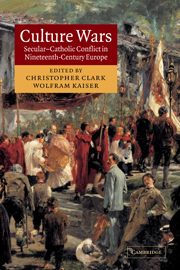Book contents
- Frontmatter
- Contents
- List of illustrations
- List of contributors
- Introduction: The European culture wars
- 1 The New Catholicism and the European culture wars
- 2 ‘Clericalism – that is our enemy!’: European anticlericalism and the culture wars
- 3 ‘Priest hits girl’: on the front line in the ‘war of the two Frances’
- 4 The battle for monasteries, cemeteries and schools: Belgium
- 5 Contested rituals and the battle for public space: the Netherlands
- 6 Nonconformity, clericalism and ‘Englishness’: the United Kingdom
- 7 The assault on the city of the Levites: Spain
- 8 Roma o morte: culture wars in Italy
- 9 Enemies at the gate: the Moabit Klostersturm and the Kulturkampf: Germany
- 10 Village quarrels and national controversies: Switzerland
- 11 The Counter-Reformation's last stand: Austria
- 12 The uncivil origins of civil marriage: Hungary
- Annotated bibliography
- Index
9 - Enemies at the gate: the Moabit Klostersturm and the Kulturkampf: Germany
Published online by Cambridge University Press: 23 July 2009
- Frontmatter
- Contents
- List of illustrations
- List of contributors
- Introduction: The European culture wars
- 1 The New Catholicism and the European culture wars
- 2 ‘Clericalism – that is our enemy!’: European anticlericalism and the culture wars
- 3 ‘Priest hits girl’: on the front line in the ‘war of the two Frances’
- 4 The battle for monasteries, cemeteries and schools: Belgium
- 5 Contested rituals and the battle for public space: the Netherlands
- 6 Nonconformity, clericalism and ‘Englishness’: the United Kingdom
- 7 The assault on the city of the Levites: Spain
- 8 Roma o morte: culture wars in Italy
- 9 Enemies at the gate: the Moabit Klostersturm and the Kulturkampf: Germany
- 10 Village quarrels and national controversies: Switzerland
- 11 The Counter-Reformation's last stand: Austria
- 12 The uncivil origins of civil marriage: Hungary
- Annotated bibliography
- Index
Summary
Gentlemen, anyone who believes in our day and age that he must carry his religion around with him, anyone who feels obliged to wear a particular dress, who swears grotesque vows, who bands together in herds, and who, when all is said and done, swears unconditional loyalty to Rome, the bitterest enemy of our young German and Prussian glory – such people can have no place in our state. That is why I say: away with them as fast as possible. (Enthusiastic cheers).
During the Prussian Landtag debate of 7 May 1875 on the prohibition of religious orders and congregations, the National Liberal deputy Georg Jung lent expression to a central feature of the Kulturkampf: the symbolic exclusion of Catholicism from the hegemonial version of national culture. This process had been underway since the end of the eighteenth century. To enlightened Protestant North Germans, Catholicism appeared exotic and alien. In the nineteenth century, the ‘orientalist’ image of a static, historyless Catholic world served as a foil to the construction of a modern identity that was secular but confessionally coloured. While the decisive protagonists of the Kulturkampf, the liberals, saw Protestantism – which for most was their own confessional affiliation – as compatible with modernity, they perceived Catholicism as ‘modernity's other’.
At first glance, this perceived dichotomy appears to be borne out by the inner development of both confessions.
- Type
- Chapter
- Information
- Culture WarsSecular-Catholic Conflict in Nineteenth-Century Europe, pp. 227 - 254Publisher: Cambridge University PressPrint publication year: 2003
- 7
- Cited by



